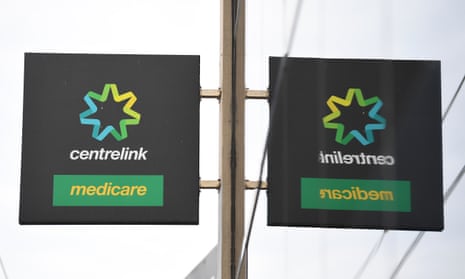Nearly 1,000 robodebt victims had their debts sent to an external debt collector even after the government had admitted in court that the program was unlawful, new figures show.
A Commonwealth Ombudsman’s report released last month lashed Services Australia for failing to halt all debt recovery activities after November 2019, when the Morrison government accepted its method for raising debts was “legally insufficient”.
In response to questions on notice from a Senate inquiry, published on Wednesday, the agency that ran the scheme has revealed it continued accepting repayments from more than 123,500 people after that date.
And there were 961 people who “had debts of this type that were referred to an External Collection Agent” that later required “remediation”, it said in another response.
One of the key complaints among victims of the scheme has been the conduct of external debt collectors, with one robodebt recipient who was hounded telling Guardian Australia last year he still receives counselling to discuss trauma from the period.
Of the 123,500 people who continued to pay money on debts after the government had accepted its scheme was unlawful, the agency said the “majority” had “made their last repayment in respect of these debts prior to 29 February 2020”.
“Both the process to review a customer record to identify the use of income averaging in debt raising, and the freezing of debt recovery, required manual action by an agency staff member,” it said.
The agency announced a refunds process in late May, after it was earlier revealed by the Guardian in March, and the money began flowing in July 2020.
Services Australia said the debts generated using the unlawful method that had been sent to external debt collectors were recalled “as soon as the debt was identified for remediation”.
In an earlier response to the ombudsman, the agency argued it would have been confusing for customers to stop all debt recovery, because some people’s debts were legitimate.
It said that it could not simply stop recovery of robodebts – raised using the unlawful “income averaging” method – because each one needed to be manually identified by staff in a process that took months.
But the ombudsman said it should have placed a blanket pause on debt recovery because it was unacceptable for the agency to keep taking payments on debts it “knew had a high likelihood of being raised on ‘legally insufficient’ grounds”.
The ombudsman’s report also noted the agency had itself acknowledged there were risks that some unlawful debts had not been identified by staff through its process.
Services Australia told the Senate inquiry in a response published Wednesday that 486 debts had later been identified upon further review.
The responses also revealed that one robodebt worth $21,544.34 had still not been repaid to the victim.
The agency said this was because the “former customer is yet to update their details”, though it was unclear whether the agency had managed to make contact to alert them of their right to a refund.
Services Australia told a Senate estimates hearing on Monday it had now repaid $724m back in robodebt refunds, which was 96.4% of all victims.
It comes as the federal court considers a $1.2bn settlement with a class action run by Gordon Legal on behalf of more than 400,000 robodebt victims.
Hearings to consider the settlement will be held in the federal court on Thursday and Friday.
